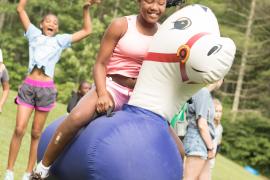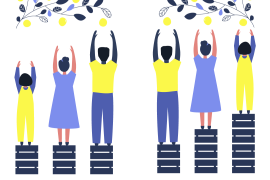Here you are, catching up, maybe relaxing now that camp is over. You’re reflecting on the joy of having experienced another successful season; the sadness of saying goodbye to campers and staff who have developed meaningful relationships; your readiness (or not) to review staff and camper evaluations; worry about budgets and funding for next year; and wondering what constitutes “normal” as we go forward. I am envisioning your eyes glazed over, brains exploding, exhausted, wanting/needing a vacation and thinking, And now you’re telling me that I have to throw out all those songs we love and have been singing forever?
In a word, yes. But the real issue is not individual songs that may or may not seem appropriate, but how we think about our song collections, which will guide us as we develop a process to look at the songs. And it’s hard to talk about a song collection without talking about the bigger issues related to systemic racism.
We are living in a period of immense upheaval and disequilibrium. Our camp values and traditions are being challenged as never before. Difficult societal issues of racial, ethnic, and economic disparities require us to evaluate and reevaluate our operations through the lens of diversity, equity and inclusion (DEI). The DEI lens, in turn, requires us to examine how many of our long-held assumptions and camp traditions have contributed to and/or been shaped by such issues. The good news, as child development theorist Jean Piaget describes it, is that the very disequilibrium we are experiencing is exactly what will propel us toward our next stage of development (McLeod, 2020).
So what does the process of reviewing song lyrics look like? I will discuss what I think are the five main keys to revisiting our camp song collections:
- The role camp singing plays in relation to our camp’s values
- Questions to ask in evaluating songs
- Who should be involved in the process
- What the evaluation process should include
- Available resources to support our work
What Role Does Camp Singing Play?
Singing may be the single most important camp activity for creating a sense of community. Camp directors intuitively know that singing brings the group together, breaks down barriers, unites generations, helps kids learn new things, teaches life lessons, helps kids value tradition, and provides campers with something they can take home and share with their families. (Breger, 2013). We learn to depend on each other when we harmonize or sing rounds. And, of course, it’s fun. The directors’ intuition is supported by a growing body of research on how singing affects our brains.
What Questions Should We Ask When Evaluating Song Collections?
Songs have words and words matter. Whether they are silly or serious, words leave a lasting impression. They have and convey meaning. We often sing the songs we love without stopping to think about and analyze what messages we absorb consciously and unconsciously. So the first question to ask is, “Does a song support or undermine our camp values?”
Additional questions include:
- Does the song demean a person or a group?
- Does it perpetuate a negative stereotype?
- Does it reflect universal “truths” or cultural values of a specific group?
- What’s the history of the song, and what does that history tell us about its meaning?
- Where does/did the song come from, and how did it find its way into our repertoire?
A song that could potentially demean a person, for example, is the kid favorite “I’m a Nut.” The lyrics describe all the crazy, silly things a person does that cause them to repeatedly declare in the refrain, “I’m a nut.” But kids sometimes think it’s funny to sing that refrain in third person, labeling another camper the nut. It’s OK to call yourself a nut, but even a silly song takes on a different meaning the second you change pronouns. You’re no longer laughing at yourself; you’re putting down another person (Breger, 2013).
Other questions will arise as you begin your exploration. It isn’t necessarily important to answer all of them, certainly not at first. But it is important to allow them to emerge, to lead to additional questions, and to look for patterns and hidden meanings.
Who Should Be Involved in the Review Process?
You’ve begun to ask a lot of questions, enjoying reassurance in some cases and encountering uncomfortable answers in others. Now what do you do? And with whom?
Form a committee or a group that is large enough to be inclusive, one that brings together decision-makers (including owners and directors), staff (including song leaders and other counselors), campers, alumni, and parents. In other words, a group that represents all your stakeholders. And maybe a few “outsiders” as well, people who have some knowledge and expertise in dealing with sensitive issues and who might contribute fresh ideas and help broaden the discussions. The process will be a little messy. But that’s not necessarily bad — and the process may well lead to stronger and more positive outcomes.
Once established, this committee should be permanent. To provide stability and continuity, membership terms should be overlapping (not unlike a board of trustees). Issues and questions about songs will always come up, and when they do you will want to have the mechanism and process in place to deal with them in an open and equitable way. In fact, the committee should also define the process.
What Should the Process Include?
There is value in asking questions, more questions, and even more questions before making a decision. Too often, we rush through an uncomfortably amorphous process to get to the decision or develop a policy, which is more concrete. However, no one policy nor set of guidelines can cover all possible situations. We need a tool kit that allows us the space to make decisions based on specific situations rather than trying to fit all situations into one policy. We need the flexibility to face song challenges.
What are some of those challenges and situations you might encounter? Here are just a few:
- The camp director wants a specific song, and the song leader hates it or is offended by it — or vice versa, the song leader wants to introduce a new song and the camp director says, “Forget it!”
- A camper or parent complains to you that a song is racist or sexist and wants it removed from the repertoire. Another camper or parent argues the opposite.
- You and your staff determine that a much-loved song is offensive by today’s standards. Do you modify the song (i.e., change the words)? Do you remove the song from your repertoire? Do you ignore the “complainers”? What if you remove the song and a camper wants to know why it isn’t sung anymore? How do you talk about the changes in ways that are inclusive and support the value of community?
Where’s my tool kit?
In addition to or alongside these challenges, we must continue to explore our own personal ideas and issues concerning racism. No matter how well-meaning we are, biases are there.
So, what’s in the tool kit?
- Deep, introspective-not-defensive thinking, beginning with a very clear understanding of your own personal and camp values and beliefs.
- Knowledge and understanding of the deeper issues around isms, including the ways in which some people may experience feeling left out — along with the likelihood that a thorough reality check will validate their feeling.
- The will and dogged determination to reach equitable, sometimes elusive solutions to the issues confronting you.
- Knowing and accepting that the journey will be bumpy and the conversation often difficult.
- An openness and willingness to continue the journey and engage in the conversations — no matter what.
- A collection of resources: books, articles, organizations (and their websites), and people.
What Are Some Resources to Support Our Work?
Here’s a look at some resources you may find helpful, thought-provoking, challenging, and reassuring, whether you’re just beginning to assess your songs for unintentional bias, racism, and discrimination, or you are familiar with the process:
- Piaget’s Theory and Stages of Cognitive Development: Background and Key Concepts of Piaget’s Theory, by Dr. Saul McLeod
- Piaget can be complicated and not always easy to understand. This particular article presents his theory clearly and succinctly, along with helpful graphics.
- Singing Together: How to Teach Songs and Lead Singing in Camps and Schools, by Jacki Breger
- Chapters 1 and 3 are especially relevant to the value of camp singing and managing your song collection.
- The World in Six Songs: How the Musical Brain Created Human Nature, by Daniel Levitin
- Daniel Levitin is a rock musician turned neuroscientist whose research has led him to believe that “the Musical Brain Created Human Nature” rather than visa-versa.
- “Choir Singing Improves Health, Happiness — and Is the Perfect Icebreaker,” by Jacques Launay
- Substitute “camp singing” for “choir” and this brief article makes even more sense for us “campers.”
- CampWire Episode #21: Great Camp Singing Experiences and Song Leading
- This podcast discusses the transformational power of camp singing.
- “Does Your Camp’s Culture Reflect Your Values?” by Audrey Monke
- This article will help you clarify your camp values in general, as well as how you can apply them to your song collection.
- Guide for Selecting Anti-Bias Children’s Books, by Louise Derman-Sparks
- Louise Derman-Sparks is an internationally respected antibias educator and author. Although this guide looks specifically at children’s books, it can be very helpful in evaluating our song collections.
- “Race and Camp: Creating an Environment in Camp Communities That Is Truly Welcoming to People of Color,” by Bob Ditter
- Ditter covers a wide range of issues, including clarifying some terms and phrases such as “I am not a racist,” “All Lives Matter,” and “white privilege.”
- CampWire Episode #29: Diversity, Equity, and Inclusion Roundtable Discussion
- This podcast covers a wide range of issues regarding DEI. Two things stand out for me: ways in which we perpetuate stigmas of integration, how participants often feel left out, in spite of our best intentions; and relevant or irrelevant song collections. There’s much more, all worth hearing.
- “White Privilege: Unpacking the Invisible Knapsack,” by Peggy McIntosh
- This is a gem of an article about one woman’s discovery of her own white privilege, written in a way that can help us recognize similarities in our own experiences.
- White Fragility: Why It’s So Hard for White People to Talk About Racism, by Robin DiAngelo
- This an excellent resource to help us well-meaning white folks see and understand ways in which we ignore, resist, and challenge notions of our white privilege.
- CampWire Episode #34: Talking with Campers about Racism
- This podcast discusses ways in which racism impacts campers of color and programs that focus on activism and social justice, sharing strategies and activities to help camps improve their practices.
- Fostering Civil Discourse: How Do We Talk About Issues That Matter?
- Facing History and Ourselves is an organization whose mission is to use lessons of history to challenge teachers and their students to stand up to bigotry and hate. Although focused on formal education, I have found their materials and webinars useful and informative, and readily adaptable to camps.
- Courageous Conversations about Race: A Field Guide for Achieving Equity in Schools
- These folks also offer training sessions.
You Have to Have the Conversation
Conversations are critically important to the successful review of song collections, as well as to the larger issues around DEI. More often than not, these conversations are difficult and challenging, and it feels easier not to have them. However, they form a necessary path toward meaningful change. Fortunately, there are some valuable guidelines. For example, in his Camping Magazine article “Race and Camp: Creating an Environment in Camp Communities That Is Truly Welcoming to People of Color” (see the Resources section), Bob Ditter offers these “Six Practices for Creating Deeper Dialogue and Greater Understanding”:
- Listen without judgment.
- Replace judgment with curiosity.
- Understand the difference between intention and impact.
- Practice “radical acceptance.”
- Step outside the conversation and talk about how you are talking.
- Start with something you can both agree on (Ditter, 2020).
Julie Olsen Edwards, coauthor, along with Louise Derman-Sparks, of Anti-Bias Education for Young Children & Ourselves, shared these “Four Steps for Sensitive Discussion” with me:
- Try to be appreciative and nondefensive. Instead of saying, “We’ve always (or never) done this,” try “I appreciate your concern,” “I’m glad you brought this up,” or “I’m happy you came to me . . . .”
- Stay engaged in thoughtful conversation; try to avoid pronouncements and dismissive comments.
- Double-check that you understand what’s being said.
- What’s next? Have we reached an agreement? Do we need additional conversation? Who else should be brought into the conversation?
Another important guide is the Four Agreements of Courageous Conversations:
- Stay engaged.
- Experience discomfort — it isn’t easy.
- Speak your truth, not what you think others want to hear.
- Expect and accept nonclosure — be willing to “hang out in uncertainty” and not rush to quick solutions (Courageous Conversations, 2021).
The link to the Courageous Conversations website is included in the resources list.
Finally, the most valuable resource is people. One thing I truly love about camps and camp people is that we believe in the importance of the community and are willing and eager to share information and practices with each other. Revisiting our song collections is definitely something we can, and should, do together. Perhaps we can have a monthly or bimonthly Zoom call about specific songs and challenges as they arise (something I would be happy to coordinate).
What we want is a vibrant collection of songs in a variety of styles that are serious and silly, that represent our values, that bring us together, and that are fun and wonderful to sing!
Photo courtesy of Camp Weequahic, Lakewood, PA
Jacki Breger is a veteran songleader in camp, school and concert settings, and has been a camp counselor/song leader and director in both day and resident camps. She is a seasoned workshop presenter at local, regional, and national conferences. She hosted a radio program for kids about folk and classical music, has produced five albums of songs for children, and has written a book on how to teach songs and lead singing. She was featured on the ACA CampWire Podcast #21 on camp singing, and she has written and presented workshops about antibias curriculum for schools and singing programs.
References
Breger, J. (2013). Singing together: How to teach songs and lead singing in camps and schools. Monterey, CA: Healthy Learning.
Courageous Conversations. (2021). Retrieved from courageousconversation.com
Ditter, B. (2020, September). Race and camp: Creating an environment in camp communities that is truly welcoming to people of color. Camping Magazine. ACAcamps.org/resource-library/camping-magazine/race-camp-creating-environment-camp-communities-truly-welcoming-people-color
McLeod, S. A. (2018, June 06). Jean Piaget's theory of cognitive development. Simply Psychology. simplypsychology.org/piaget.html




